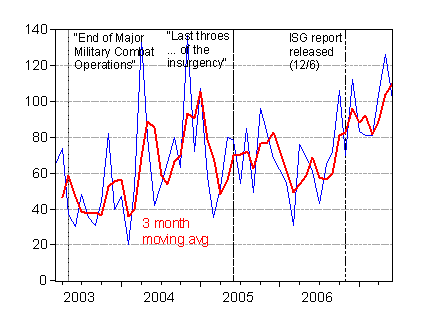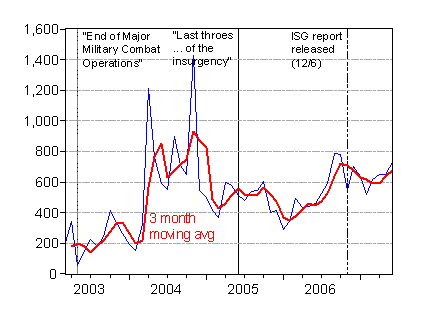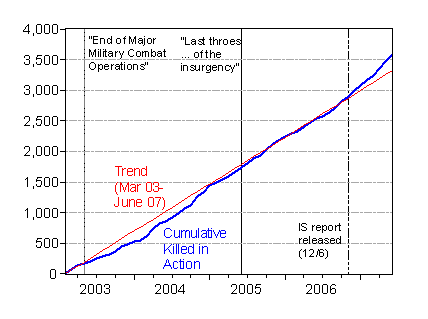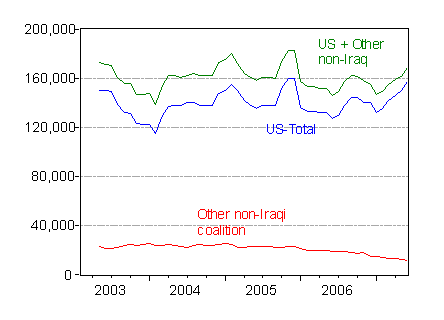Expenditures continue to rise. More appropriations will likely be needed at this pace.
From AP via Forbes:
Report: War Costing US $12B a Month
By ANDREW TAYLOR 07.09.07, 3:58 PM ET
The boost in troop levels in Iraq has increased the cost of war there and in Afghanistan to $12 billion a month, and the total for Iraq alone is nearing a half-trillion dollars, congressional analysts say.
All told, Congress has appropriated $610 billion in war-related money since the Sept. 11, 2001, terror assaults, roughly the same as the war in Vietnam. Iraq alone has cost $450 billion.
The figures come from the nonpartisan Congressional Research Service, which provides research and analysis to lawmakers.
For the 2007 budget year, CRS says, the $166 billion appropriated to the Pentagon represents a 40 percent increase over 2006.
The Vietnam War, after accounting for inflation, cost taxpayers $650 billion, according to separate CRS estimates.
The $12 billion a month “burn rate” includes $10 billion for Iraq and almost $2 billion for Afghanistan, plus other minor costs. That’s higher than Pentagon estimates earlier this year of $10 billion a month for both operations. Two years ago, the average monthly cost was about $8 billion.
Among the reasons for the higher costs is the cost of repairing and replacing equipment worn out in harsh conditions or destroyed in combat.
But the estimates call into question the Pentagon’s estimate that the increase in troop strength and intensifying pace of operations in Baghdad and Anbar province would cost only $5.6 billion through the end of September.
If Congress approves President Bush’s pending request for another $147 billion for the budget year starting Oct. 1, the total bill for the war on terror since Sept. 11 would reach more than three-fourths of a trillion dollars, with appropriations for Iraq reaching $567 billion.
Also, if the increase in war tempo continues beyond September, the Pentagon’s request “would presumably be inadequate,” CRS said.
The latest estimates come as support for the war in Iraq among Bush’s GOP allies in Congress is beginning to erode. Senior Republicans such as Pete Domenici of New Mexico and Richard Lugar of Indiana have called for a shift in strategy in Iraq and a battle over funding the war will resume in September, when Democrats in Congress begin work on a funding bill for the war.
Congress approved $99 billion in war funding in May after a protracted battle and a Bush veto of an earlier measure over Democrats’ attempt to set a timeline for withdrawing U.S. combat troops from Iraq.
The report faults the Pentagon for using the Iraq war as a pretext for boosting the Pentagon’s non-war budget by costs such as procurement, increasing the size of the military and procurement of replacement aircraft as war-related items.
I would have preferred to cite the original CRS report, but I couldn’t find a copy online. Below is a graph of monthly cumulative burn rates, with the FY’07 figures as reported by AP.

Figure 1: Monthly burn rate for Iraq Theater of Operations, in billions of dollars per month (bdpm), by fiscal year (blue line). Source: For FY2003-06, Amy Belasco, “The Cost of Iraq, Afghanistan, and Other Global
War on Terror Operations Since 9/11,” Congressional Research Service Report RL33110, March 14, 2007, Table 1; for FY 2007, from AP via Forbes. Baseline (green), from September 2006 CRS report. For FY 2007-08 “Hi” estimate (red), author’s calculations based upon reported figures (see this post).
The currently estimated burn rate is higher than reported back in January (even after the announcement of the surge), but lower than my estimate from April. On the other hand, without the entire report, it’s unclear to me what is — and is not — included in the cost estimates.
What we do know is the trend in casualties.

Figure 2: Fatalities in Iraqi theater of operations, through June (blue), and 3 month moving average (red). Source: Iraq Coalition Casualty Count accessed on 17 July 2007.

Figure 3: Casualties in Iraqi theater of operations, through June (blue), and 3 month moving average (red). Source: Iraq Coalition Casualty Count accessed on 17 July 2007.

Figure 4: Cumulative fatalities in Iraqi theater of operations, through June (blue), and trend based on entire sample up to June 2007 (red). Source: Iraq Coalition Casualty Count accessed on 17 July 2007.
A last graph depicts US and other non-Iraqi coalition force levels in theater. Note that non-US forces are trending downward, with British forces likely to fall considerably in the next few months.

Figure 5: Troop levels in Iraq theater. Source: Brookings Iraq Index.
Technorati Tags: Iraq, casualties,
force levels,the surge, burn rates.
The Vietnam War, after accounting for inflation, cost taxpayers $650 billion, according to separate CRS estimates.
That’s an interesting factoid. Vietnam was a much larger, wider, longer conflict, yet we’re approaching its monetary costs 250% faster.
This simply has to reflect the stupidly high cost of advanced aircraft and whatnot. Back in Vietnam, you could get a Thud for mere millions. Now, the advanced jets are well into the billions. Bradley fighting vehicles, M1 tanks, and Humvees are expensive as well.
In terms of the costs that really count, the lives of American troops, there is no comparison. Vietnam cost 50k+ lives in ten years. We’re an order of magnitude less than that in Iraq.
On the flip side, lets look at the cost of failure. Failure in Vietnam cost the lives of millions of Vietnamese, Cambodians, and Laoatians. Post-war Communist attrocities were unprecidented in their brutality, and that’s saying something of an ideology that spawned Stalin and Mao.
What’s the human cost of failure in Iraq going to be? Millions?
Or maybe you think that the Sunnis deserve what they’re going to get, just like the South Vietnamese did.
I am a retired AF officer and Vietnam vet. My son has has served two tours to Iraq. Unrelated to either fact, I have been four square against this war almost since the beginning. It is the wrong stategy, carried out poorly and with virtually no chance of any outcome that could be identified as victory. Yet here we are. Regarding money, the half trillion is, of course, very conservative in direct costs and well short of actual incurred costs. The additional costs for care of vets is on an order of magnitude greater. (Not unlike our unique budget accounting for Social Security and Medicare.) Separately, in military terms, the asymmetrical nature of this war – not unlike Viet Nam – provides great advantage to the enemy. As Buzzcut accurately points out, we use very expensive equipment to fight against an almost feudal enemy. We will run out of money long before they run out of suicide idiots. And, of course, there is history. Reinforcing Santayana’s advice, please read British Lt-General Sir Stanley Maude’s “proclamation” upon entering Baghdad in 1917 and W’s speech in March 2003. (Also note the outcome of that – and every previous – invasion.) If it weren’t for oil . . .
I am of the opinion that we can’t afford this war strategically, morally or economically. Unfortunately it might already be too late to fix this in any of those respects.
It appears that the tide is swinging to our side with Petraeus’ surge and ‘take and hold’ approach; we’ll get a full report in September. I remain cautiously optimistic that our efforts, along with the newly emergent support from Iraqis against Al Qaeda, will be showing real progress later this summer.
Steady on course, folks.
Ex-Navy guy,
jg
Interesting perspective on current and future developments in Iraq/Iran:
http://www.financialsense.com/editorials/duarte/2007/0718.html
My friend William Lambert wrote:
There are many points of disinformation that should be observed. One is that the current occupation after a war, is unsuccessful. Based on history, you can compare this to Germany after WWII, when three million Allied troops in Germany had to face the “Werewolves” set up by Heinrich Himler in 1945. The same guerrilla tactics were used, attacks on infrastructure, sniping, and targeting innocent civilians, who are the hardest to protect. It is reported that the Werewolves actually assassinated the Supreme Russian military leader there, General N.E. Berzarin, who was rumoured to have been waylaid in Charlottenburg during an incident in June 1945. In late March 1945, a Werewolf paratroop squad assassinated the Lord Mayor of Aachen, Dr Franz Oppenhoff, probably the most prominent German statesman to have emerged in the occupied fringes over the winter of 1944-45. The Allies and Soviets reacted to the movement with extremely tough controls, curtailing the right of assembly of German civilians. Challenges of any sort were met by collective reprisals — especially on the part of the Soviets and the French.
The mitigating facts in Germany were that most of the able-bodied men were impressed into chain-gangs all over Europe rebuilding the countries that Hitler had razed.
Often we lose the reality of history.
Questions:
Would the US be safer if we pull the troops out?
Would the World be safer if we pull the troops out?
Would Iraq be safer if we pull the troops out?
Will there be a holocaust if we pull the troops out?
If the troops are pulled out will you be safer?
What would have happened to Germany if we had pulled troops out after 5 years?
What would have happened to Korea if we had pulled troops out after 5 years?
When will we pull troops out of Germany and Korea, should we?
What will happen in Saudi Arabia if we pull the troops out?
What will happen to Egypt?
Now look at a map. If Iraq falls under the influence of Islamo-Fascists like Iran and Syria there will be Islamo-Fascist control from the Mediterranean to the Indian Ocean. If Saudi Arabia and Egypt fall there will be Islamo-Fascist control of most of northern Africa.
We are only a few misguided steps away from rebuilding the Islamic Empire.
Would the US be safer if we pull the troops out?
Would the World be safer if we pull the troops out?
Would Iraq be safer if we pull the troops out?
Will there be a holocaust if we pull the troops out?
If the troops are pulled out will you be safer?
What would have happened to Germany if we had pulled troops out after 5 years?
What would have happened to Korea if we had pulled troops out after 5 years?
When will we pull troops out of Germany and Korea, should we?
What will happen in Saudi Arabia if we pull the troops out?
What will happen to Egypt?
The answer to all of these: WHO KNOWS?
We are only a few misguided steps away from bankrupting our country.
You are right, DF.
Here is a Life Magazine article from 1946, laying out how we were on the wrong path with post-war Germany; fascinating.
http://www.kultursmog.com/Life-Page01.htm
http://www.kultursmog.com/Life-Page02.htm
Questions:
Would the US be safer if we pull the troops out? **No**
Would the US be safer if we keep the troops in? **No**
Better Question: Would the US be safer if we had not invaded? **Yes**
Would the World be safer if we pull the troops out? **No**
Would the World be safer if we keep the troops in? **No**
Better question: Would the World be safer if we had not invaded? **Yes**
Would Iraq be safer if we pull the troops out? **No**
Would Iraq be safer if we keep the troops in? **No**
Better Question: Would Iraq be safer if we did not invade? **Yes**
Will there be a holocaust if we pull the troops out? **Maybe**
Would there be a holocaust if we keep the troops in? **Seems to be a low level holocaust occuring right now**
Better Question: Would there be a holocaust if we had not invaded? **No**
If the troops are pulled out will you be safer? **No**
If the troops are left in would you be safer? **No**
Better Question: If the troops had never been placed in-country would you be safer? **Yes**
When will we pull troops out of Germany and Korea, should we? **When the GDP of those countries could support equivalent troop levels to replace US forces. You Bet!**
What will happen in Saudi Arabia if we pull the troops out? **Same thing that will happen if we leave the troops in.**
What will happen to Egypt? **Same thing that will happen if we leave the troops in.**
Just my two cents.
DickF — according to the official US Army history of the occupation of Germany there was not a single confirmed case of a single Werewolf attack on US soldiers.
One of the difference in cost between Vietnam and Iraq is the cost of the all volunteer army. In Vietnam the grunt was basically paid cigarette and beer money and fed at the mess hall. Now the same personell are paid competitive wages.
Even if peace suddenly broke out today and Iraq miraculously transformed itself into Switzerland, it would still cost us a boatload of money to withdraw all of the equipment and personnel. And long after the war is over it will take the Pentagon a long time to recover. Over the last 6 years the Pentagon has progressively built up a logistics base that is on a wartime footing. It will be very expensive to shut down or even throttle back that rampled up logistics base. There’s going to be a prolonged period of indecision as DoD tries to figure out just what kind of force it will need in the future. The safest bet is that DoD will try to cover all possible contingencies with every weapon system that comes down the pike. My son will be paying for this war until his hair is as gray as mine.
I must say that this is the most thoughtful blog that I have ever seen or participated in. Obviously people disagree but at least there are considered comments with actual support for their arguments rather than just knee jerk attacks.
That said, this is an economics blog and this is much more than an economic issue. Two things occur to me nonetheless. First, withdrawal or retreat are not synonymous with defeat. There have been many retreats by victorious armies throughout history. The key is having the right leadership to adapt the plan to the situation. (And, of course, be sure that the military is the right solution). Second, as others have mentioned above, the financial burden for this will be disproportionately be borne by future generations (along with all the other things we have been putting on the “national credit card”). At the same time our country will have less and less ability to repay these debts.
War – and debt – are hell.
As an ex accountant, and amateur economist, the concept of cost and benefit is always intriguing.
Generally there is quite a big boost to R&D spending in war time, with a later payoff to the economy as a whole.
The “cost” to the government is representing an economic benefit to someone. Would these personnel be unemployed if there was no war in Iraq?
I bet some sectors of the Iraq economy are doing quite well out of all the spending in their geography.
Certainly the war doesn’t seem to have affected their soccer team which was able to beat Australia 3:1 the other night.
Here are some interesting numbers:
At $450B spent so far in Iraq, this comes to roughly $30,000 for every single Iraqi! I think we should just buy them each a new SUV next time.
This also translates into about $1,500 for every single person in the US. For a family of 4, that is a tax bill of $6,000 (+ interest). I would like my money back thank you very much!
Further, no one ever seems to mention that there are probably a quarter million dead Iraqis because of this war. Genocide *if* we leave indeed!
Finally, bin Laden could never have dreamed of such success on 9/11. The terrorist’s goal is to create conflict and chaos …he must be laughing at us as we spill our blood and spend our treasure …and simply achieve more chaos.
Hmmm …looked it up and there are actually ~27 million Iraqis …I thought there were 15 million. This means total cost per Iraqi is actually just under $17,000 (so far).
A different stat that jumped out at me though was their 2006 GDP! It is about $90 Billion, yet we are spending $10 Billion a month on the war!
jg,
we’ll get a full report in September
This is a perception that the MS media has created. The September meeting will simply be a status report on the “SURGE.” Democrats in congress are attempting to make this update a decision do or die decision date.
No matter what is reported in September we will still be in Iraq.
Footwedge wrote:
I must say that this is the most thoughtful blog that I have ever seen or participated in.
Totally agree.
That said, this is an economics blog and this is much more than an economic issue.
Foot,
War is an economic decision but it is more of an entrepreneurial decision than an econometric decision. In dollars and cents all wars are losers, no one wins. But if aggression is allowed to overwhelm a nation then econometric analysis is meaningless. It is good to know the cost of war, but war is about survival and so does not lend itself to a pencil.
Our decision on war must always be survival not monetary cost. That is why I asked the questions earlier. They are much more important questions than dollars and cents and body counts.
Annon said that we would be safer if we had not interred a war with Iraq. I ask you to look at a map. Islamo-Fascists are in control in Syria and Iran. Control of Iraq completes the control from the Mediterranean to the Indian Ocean. There is a good case to be made that if Iraq had not been invaded Saudi Arabia would be totally under the control of Islamo-Fascists. As with most wars this war is strategic.
Can you imagine what economists and others would be saying if we spent $10 billion a month on a domestic social program that’s worked as “well” as our adventure in Iraq? Especially with no end to the conflict/ spending in sight and the financial and human investment leading to results that are level at best (this is from the people paid to say things are going well) and deteriorating drastically at worst?
And all this without any extra sacrifice from Americans to pay for it. Fiscal conservatives, indeed. 🙁 And the long-term economic consequences are much worse from a failed domestic program than a chaotic Iraq, because a chaotic Iraq doesn’t mean extra U.S. prison costs, lack of productivity and widening inequality gaps and resentment between classes.
“Islamo-Fascists are in control in Syria and Iran.”
This forum deserves better than neoconservative talking points.
jg said “It appears that the tide is swinging to our side with Petraeus’ surge and ‘take and hold’ approach; we’ll get a full report in September. I remain cautiously optimistic that our efforts, along with the newly emergent support from Iraqis against Al Qaeda, will be showing real progress later this summer. Steady on course, folks.”
On course for what? Real progress means what exactly?? Are we talking about fewer American causalities? More trained Iraqi troops? Sunni and Shiites suddenly decide to reconcile?
It is a civil war. We cannot stop it and by arming Sunni militias it seems we recognize this. The surge is only meant to slow the inevitable. The Iraqi government is more interested in positioning for their own survival/gain than leading their people out of this mess (sounds familiar doesn’t it).
We have been turning the corner for years now and I’m sure we will be given more signs of this in September. How you can trust their words and not see what is actually happening boggles my mind. I still hope Petraeus gives an independent assessment, but don’t be suprised if it’s a partisan and more of the usual spin .
The longer we stay the more the terrorists gain strength while we become weaker. They will strike again regardless what we do in Iraq. Where we might make a difference is in Pakistan or Saudi Arabia, but we do not have the will or independence to strike them there. Going into Iraq distracted us from our mission in Afghanistan, will we let it continue to????
“Beyond the Euphrates began for us the land of mirage and danger, the sands where one helplessly sank, and the roads which ended in nothing. The slightest reversal would have resulted in a jolt to our prestige giving rise to all kinds of catastrophe; the problem was not only to conquer but to conquer again and again, perpetually; our forces would be drained off in the attempt.”
Emperor Hadrian AD 117-138
I think that it is a false dichotomy to argue that the only two options are the President’s course, and total withdrawal. There are obviously a wide variety of options, admittedlynone of them particularly palatable.
One question one has to ask is whether it is better to commit further forces — as the President has hinted at (“surging the surge”) — in order to militarily stabilize the situation in one part of Iraq (as insurgency re-allocates to other areas of Iraq) and thereby strain the Army further, or to consider other strategies. Recall, the change in approach adopted by General Petraeus is a change in tactics, not in strategy. The strategy has been — and remains — stabilize the military situation so that the political process can proceed. I think even the optimists will concur that the political process in Iraq is nearly completely paralyzed (and the advisers within the White House are aware of this).
Then, if this strategy is doomed to fail, it would be better to consider alternative strategies that would minimize the likelihood of the worst possibilities (i.e., min-max). Such possibilities would include an understanding that Iraq as a integrated political entity is not viable, absent a massive infusion of forces (as in the 400,000 suggested by former Army Chief of Staff Shinseki [1]).
So let me stress again: the alternatives are not between “staying the course” and “pulling out”. There are a multitude of options that can be intelligently discussed, and it makes no sense propose options that are clearly infeasible (staying in Iraq at current troop levels for say the next five years I consider infeasible in the absence of a draft and drastic move to full war footing).
Once one takes this view, it becomes apparent that the Administration’s current path involves nothing more than “running down the clock” until the problem becomes the next Administration’s.
Menzie wrote:
staying in Iraq at current troop levels for say the next five years I consider infeasible in the absence of a draft and drastic move to full war footing
I am curious, a “full war footing” against whom? The war has been over for years. We are now attempting to bring law and order, not war. But additionally there is the larger logistic problem I mentioned referring to the map. Absent meddling from Syria, Iran, and Al Qaeda and there would be very little crime in Iraq. The recent report on nationalities of suicide bombers in Iraq reported they were primarily Saudi.
DickF: Since we have groups of Iraqis (in addition to outside forces) shooting at each other, and at US forces, I suggest that the war is not over. If you choose to define these activities as “crime”, well that’s your prerogative. However, in either case, in order to pursue the President’s current plan, US forces in-theater are required, and the funding and supply of that effort is the “war footing” I refer to.
I think Joe Biden had it right a year or two ago …split the country 3 ways, give people time to move, then get out.
That may not represent the best interest of the US (or Exxon or Haliburton or Israel), but spending $12 billion a month on this fiasco certainly isn’t in our best interest either. It’s going to end up lose:lose no matter how we handle it at this point.
The US is very good at winning battles …we should stick to that (when necessary). Occupation eventually brings down the best of empires.
We must never lose sight of the fact that the “insurgency” actually has two objectives. The first objective is to prevent a liberal, constitutional, democratic, republic from succeeding in Iraq. The second objective is to win the media battle in the US to convince the US to pull out prematurely.
They are being more successful in the second than in the first.
The second objective is to win the media battle in the US to convince the US to pull out prematurely.
Just because your adversary prefers a particular outcome, withdrawal, does not mean that we cannot prefer that outcome ourselves.
For example, before 9/11, one of bin Laden’s stated goals was to get the U.S. to withdraw from Saudia Arabia. Shortly after 9/11 President Bush did exactly that and withdrew all U.S. troops from Saudi Arabia.
DickF said >> The first objective is to prevent a liberal, constitutional, democratic, republic from succeeding in Iraq.
Response >> This will happen when pigs fly. Iraqis generally are a superstitious, uneducated, corrupt, barbaric group of people who still stone single women to death for sleeping with someone. It was simply the fourth or fifth excuse the neocons dreamed up after the previous excuses proved untrue. It is a fairy tale.
anonymous:
Thanks for the links to Life magazine in 1946. Note that the criticism from Dos Passos of the path of the occupation was written *before* the Marshall plan was created. An example perhaps of an Adminstration which observed a problem developing, thought creatively about it, and then led public opinion to adopt an effective solution.
Of course Germany was a reasonably homogeneous culture before and after that war, not a multicultural grab bag created by colonialism and ready to disintegrate when the dictator was removed.
DickF: You are correct that the “war” has long been over. That hasn’t changed the Administration’s constant, breathless “We’re At War” rhetoric. Rhetoric which constantly insinuates that comments like yours are treasonable, by the way. At any rate, Menzie’s “war footing” comment is directed at the way we are wearing out our troops by recycling the same people on tour after tour.
I don’t think you should throw around “Islamo-fascist” without some definition. It implies the sort of top-down party control which Il Duce or Der Fuehrer exercised. Suppose this Islamic Caliphate were reconstructed. Who would be in charge? Do you really think Sunni and Shi’a tribal feuds would be settled without extended civil war? Just how worried should we be about their ability to project power beyond isolated suicide bombings? What historically has ever helped to resolve conflicts such as subsists between “the West” and “Islam”?
There is this constant line of argument that Americans don’t have the stamina for this fight, that we need to be tougher. But we’d have the same resolve we had in WWII *if* there were the remotest resemblance between the circumstances.
If the people don’t get your strategy, maybe the strategy doesn’t make sense!
Incidentally, for those who haven’t seen this before, there *were* polls done during WWII, and the public *did* understand and support that war. The public was quite supportive of Bush when it looked like he was winning. But of course, Bush failed to plan (= planned to fail) and the public has changed its mind as circumstances have changed. Maybe there *is* something to this democracy thing.
http://www.talkingpointsmemo.com/docs/wwii-polls/
STS,
Are you aware that Mien Kampf has been reported as a best seller in the Arab world especilly in Turkey?
Also are you familar with the Battle of Tours, 732 AD. and the Battle of Vienna in 1683?
How about the First Barbary War 1801-1805 and the Second Barbary War 1815?
We must understand that this conflict with Islam is not new nor will it pass easily when their hearts are set on empire.
This is not a national enemy where we can declare war on a nation. Islamo-Fascism is actually religious.
The Battle of Tours was against the Moors, the Battle of Vienna was against the Ottoman Turks, and the Barbary “Wars” were an anti-piratical campaign against the Sultan of Tripoli (Western Libya).
How on earth do any of those disparate groups equal a coordinated fascist movement? Or even an Islamic one. Simply because all they involve Muslims does not make them part of a religious based movement. Oddly enough, both the Ottomans and the Moors were noteworthy (for the time period) in their tolerance to other religious groups within their kingdom/empire.
To say that Ben Laden deserves to be put in the same category as either Moorish or the high point of Ottoman civilization is giving him far too much credit. And Saddam’s Baath party was a secular movement.